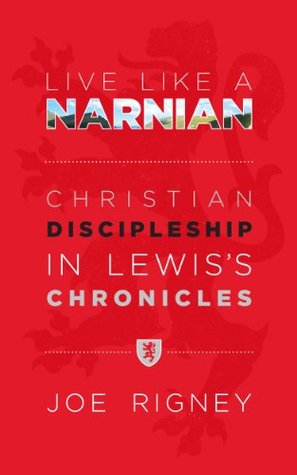More on this book
Community
Kindle Notes & Highlights
by
Joe Rigney
Read between
March 10 - March 24, 2024
In denying that the Narnian stories are allegories, Lewis does not thereby deny the Christian meaning inherent in the stories. But his goal was more nuanced than a representation of unseen reality; the literary device he chose is more aptly called “a supposal.”
“He does not despise real woods because he has read of enchanted woods: the reading makes all real woods a little enchanted.”10
Growing up doesn’t mean replacing old loves as much as it means adding new ones.
Indeed, the Witch provides two meals to Edmund: the enchanted candy and stale bread and water. The Witch and her evil are the origins of both gluttony and asceticism, of sinful indulgence and sinful austerity.
The size or expense of the meal isn’t the point; the attitude and receptivity of the meal is.
But more than just awakening my hunger, breathing Narnian air awakens a desire for a particular type of meal, one with tasty food, good conversation, lots of joy and laughter and revelry and strategizing about how to defeat the White Witch.
It makes me want to eat my bread with joy and drink my wine with a merry heart, because God approves (Eccles. 9:7). It makes me want to guard my heart against gluttony and miserliness. It makes me want to live so that those with shriveled hearts and icy minds accuse me of self-indulgence and waste. It also makes me want to live so that the accusations are false. It
makes me want to pay attention at mealtimes, both to the food on my plate and the friends at the table. It makes me want to enjoy high feasts on appropriate occasions, to eat simple meals as though they mattered (because they do), and to teach my children ...
This highlight has been truncated due to consecutive passage length restrictions.
Because Jesus, like Aslan, is Lord of the Feast.
Could it be that Edmund meets her precisely because he’s already on the wrong path? Might we not recognize the providential will of the author in guiding a particular character to endure a particular temptation? And might this Narnian providence give us a window into the invisible hand and plan that guides our own lives?
Edmund thus stands as a warning, a cautionary tale to everyone who reads the book. We are always becoming who we will be. We are, all of us, en-storied creatures, living our lives in a narrative, which means our lives have directions, trends, and trajectories. And these trajectories are guided by an Author who teaches us that we will reap what we sow. Right this minute, we are headed somewhere, and sooner or later, we are bound to end up there. Edmund shows us that we might not like the destination at the end of our road. Indeed, it could very well be the death of us.
But Aslan, like Jesus, is full of grace, and he reaps what Edmund had sown. Mercy triumphs over Judgment, Life triumphs over Death, and for Edmund (and all those who, like him, are found by Aslan in their darkest pit) all shall be well, and all shall be well, and all manner of thing shall be well.
This is the central lesson of Trumpkin: embracing obedience to lawful authority, even when you disagree with the orders.
Trumpkin shows us that coming to faith is not always like getting knocked off your horse by a blinding light. Sometimes it’s a slow process filled with unexpected twists and turns. Sometimes those who protest the loudest are the nearest to the kingdom.
Chivalry, with its dual demand on men, sought to break this cycle by creating lion-like lambs and lamb-like lions.
For manners, whether in the court or at the dinner table, are simply love in the little things, love in the trifles.
Let us instead read our fairy stories and learn from them as Chesterton did.
For this also is what it means to live like a Narnian. It means to greet the world the way that you’d greet a retired star, to resolve to see the world the way that Lewis scholar Clyde Kilby did: Resolved: 1. At least once every day I shall look steadily up at the sky and remember that I, a consciousness with a conscience, am on a planet traveling in space with wonderfully mysterious things above and about me.
Mercy, detached from Justice, grows unmerciful.
Our lives are to be a long obedience in the same direction, and our direction is far more important than our pace.
To be truly humble is to dispense with the silly nonsense about our own dignity, all the posing and posturing.


